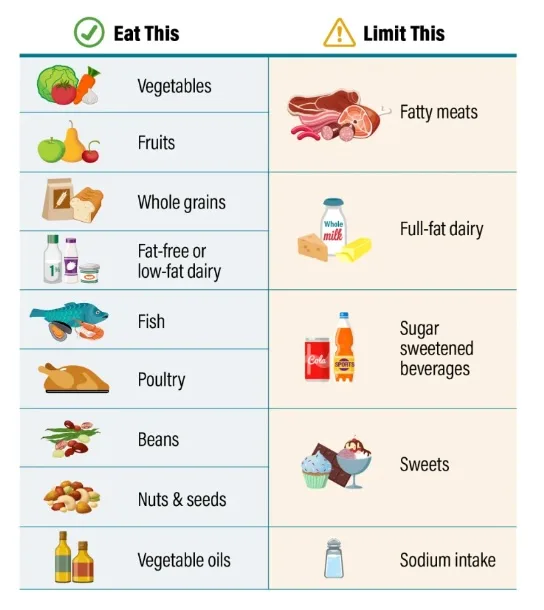Why Healthy Eating for COPD Matter
Living with Chronic Obstructive Pulmonary Disease (COPD) brings unique challenges, especially as older adults work to maintain their quality of life. A thoughtful, balanced diet plays a vital role in managing COPD. It can help sustain energy levels, strengthen respiratory muscles, and reduce inflammation, all while supporting overall health. Here, we explore practical dietary tips and highlight the foods that support better breathing and well-being. For more lifestyle tips, visit COPD Management Resources. And if you’re interested in complementary diet strategies, check out Healthy Eating Basics. Here is more information on Hypertension Management, and here is more on Trending Topics on Hypertension.
Do’s and Don’ts for Healthy Eating For COPD

Do’s >> Eat This:
- Do Focus on Nutrient-Dense Foods: Lean proteins like chicken fish, egg. whole grains, and fresh produce to maximize nutrient intake.
- Do Incorporate Healthy Fats: Include sources like avocados, nuts, seeds, and olive oil for calories and anti-inflammatory benefits.
- Do Stay Hydrated: Drink plenty of water to keep mucus thin and easier to clear.
- Do Eat Small, Frequent Meals: This helps reduce bloating and pressure on your diaphragm, making breathing easier.
- Do Include Fruits and Vegetables: Opt for a rainbow of produce to ensure a variety of vitamins, minerals, and antioxidants.
Don’ts >> Limit This:
- Limit Fried and Greasy Foods: These are harder to digest and can worsen breathlessness.
- Avoid Salty Foods: High sodium can lead to fluid retention, making breathing more difficult.
- Skip Sugary Snacks: These can lead to weight gain and inflammation, both of which strain the respiratory system.
- Cut Back on Processed Foods: These often contain preservatives and unhealthy fats that can exacerbate COPD symptoms.
- Minimize Carbonated Drinks: They can cause bloating, which puts pressure on your lungs.
Key Nutritional Tips
Proteins for Respiratory Muscle Strength
- Lean Sources: Opt for skinless chicken, turkey, fish, eggs, and low-fat dairy.
- Plant-Based Options: Include beans, lentils, tofu, and quinoa for a protein boost with added fiber.
Carbohydrates for Energy
- Choose Complex Carbs: Whole grains, sweet potatoes, and legumes provide sustained energy without spiking blood sugar.
- Limit Simple Carbs: Avoid sugary drinks and refined grains like white bread.
Healthy Fats for Anti-Inflammatory Benefits
- Do’s: Include fatty fish (like salmon and mackerel), nuts, seeds, and olive oil.
- Don’ts: Avoid trans fats and reduce saturated fats like those found in butter and fatty cuts of meat.
Vitamins and Minerals
- Vitamin D: Helps support immune health. Sources include fortified dairy, fatty fish, and sunlight.
- Vitamin C: Found in citrus fruits, bell peppers, and strawberries, it aids in reducing oxidative stress.
- Magnesium: Essential for muscle function, including breathing. Add spinach, nuts, and whole grains to your meals.
Special Dietary Considerations
For Weight Management
- Underweight: Include nutrient-dense snacks like smoothies, yogurt with nuts, and whole-grain toast with peanut butter.
- Overweight: Focus on portion control and balance calorie intake with activity levels to ease respiratory strain.
If You Use Supplemental Oxygen
- Limit Bloating Foods: Avoid cruciferous vegetables (broccoli, cabbage) and carbonated drinks.
- Stay Hydrated: Oxygen therapy can dry out airways, so drink plenty of water.
Specific Foods and Recipes
Fruits and Vegetables for Antioxidant Support
- Eat More: Dark leafy greens, berries, carrots, and citrus fruits.
- Practical Tips: Try roasted veggies with olive oil or a fruit smoothie with spinach and almond milk.
Herbs and Spices for Flavor
- Replace salt with flavorful options like garlic, ginger, turmeric, and fresh herbs to enhance taste and reduce inflammation.
Sample Meal Plan
- Breakfast: Greek yogurt with berries and a handful of walnuts.
- Lunch: Grilled chicken salad with olive oil and lemon dressing.
- Dinner: Baked salmon with quinoa and steamed asparagus.
- Snacks: Apple slices with almond butter or a handful of trail mix.
When to Seek Professional Guidance
Consult a registered dietitian or your healthcare provider if you have other conditions, such as diabetes or kidney disease, which may require additional dietary adjustments. They can create a meal plan tailored to your unique needs and ensure you’re getting the nutrients your body requires.
Healthy eating is a cornerstone of managing COPD effectively. By making informed food choices, you can support your respiratory health and overall well-being, helping you live a fuller and more comfortable life. Explore more tips and share your journey with others in our COPD Support Community.